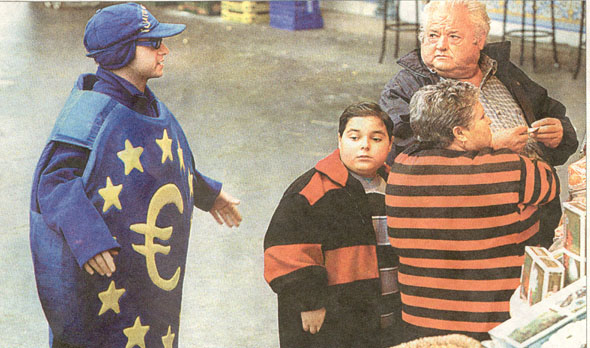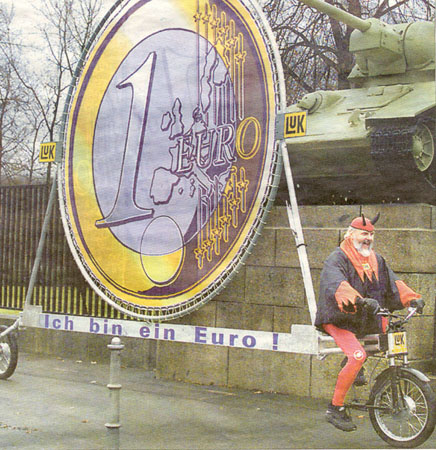Introduction:
![]() This talk
is a continuation, or an addendum, to the Non-Org talk that I gave last October.
At that time I outlined the reasons why the member countries of the European
Monetary Union (EMU) had decided to replace their domestic currencies with a
single new one (i.e.: elimination of exchange risk in intra-EMU trade and
finance operations, stronger price discipline...) I also described the most
likely risks of this enterprise (i.e.: coordination problems regarding fiscal
policies, one-size-fits-all monetary policy...) and this will be a good time to
asses the reality of some of these worries too, as well as the promises of
future prosperity.
This talk
is a continuation, or an addendum, to the Non-Org talk that I gave last October.
At that time I outlined the reasons why the member countries of the European
Monetary Union (EMU) had decided to replace their domestic currencies with a
single new one (i.e.: elimination of exchange risk in intra-EMU trade and
finance operations, stronger price discipline...) I also described the most
likely risks of this enterprise (i.e.: coordination problems regarding fiscal
policies, one-size-fits-all monetary policy...) and this will be a good time to
asses the reality of some of these worries too, as well as the promises of
future prosperity.
Last October we went over the logistics of replacing 12 (decades-old, or even centuries-old) individual currencies with a single new one. As neat and simple as the process might seem on paper this would also be a good time to evaluate how the transition worked out in practice. I was very happy to be able to witness that historical event in situ, in the streets and businesses of Madrid, Spain.

![]() If you
came to this talk curious to learn about how the Euro is doing after January
1st, 2002, I am sorry to tell you that you are somehow late. The Euro is now
more than three years old and the record is very positive.
If you
came to this talk curious to learn about how the Euro is doing after January
1st, 2002, I am sorry to tell you that you are somehow late. The Euro is now
more than three years old and the record is very positive.
The Euro was officially created in January 1st, 1999, when the, at the time, 11 members of the EMU fixed their exchange rates (ERs) with respect to a new accounting entity previously known as the ECU and now re-named the Euro. The fact that the EMU countries were able to sustain those fixed ERs gave them access to the full range of benefits from a monetary union -outlined in my previous talk:
![]() So, in
conclusion, if my first talk about the Euro I outlined the macroeconomic impact of
the single currency this talk will look into the microeconomic aspects of the
transition. Keep in mind that some of these "micro" issues (i.e.: rounding out
of prices in Euros) will have a "macro" impact (i.e.: potential higher
inflation) due to their cumulative effect on aggregate economic activity.
So, in
conclusion, if my first talk about the Euro I outlined the macroeconomic impact of
the single currency this talk will look into the microeconomic aspects of the
transition. Keep in mind that some of these "micro" issues (i.e.: rounding out
of prices in Euros) will have a "macro" impact (i.e.: potential higher
inflation) due to their cumulative effect on aggregate economic activity.
![]() As
always, it is good to start a talk with one (or more than one) joke:
As
always, it is good to start a talk with one (or more than one) joke:
